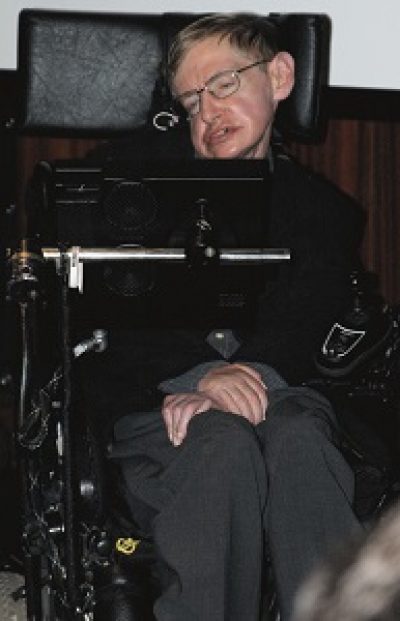Stephen Hawking - A Bright Star Extinguished (Ros' Blog)

I’m sure that everyone was saddened by the news last week of the death of Professor Stephen Hawking. He is, of course, best known for his amazing advancement of knowledge and understanding in the fields of Cosmology and Theoretical Physics. But he shone as a human being in so many other ways than just his professional accomplishments.
He was a renowned wit. He was happy to take part in sketches for comic relief, as well as an episode of The Simpsons. “Life would be tragic,” he said, “if it weren’t funny.” John Oliver, the host of HBO’s “Last Week Tonight” show, known for his humorous take on current affairs, was once interviewing Professor Hawking. He mischievously asked him, “You’ve stated that you believe there could be an infinite number of parallel universes. Does that mean there’s a universe out there in which I’m smarter than you?” Hawking replied, “Yes, and also one in which you’re funny!”
It’s not uncommon to meet people with enormous intellect but a lack of human wisdom. That accusation could never have been levelled at Professor Hawking. He became famous for pithy aphorisms such as, “Quiet people have the loudest minds”; “The greatest enemy of knowledge is not ignorance, it is the illusion of knowledge”; “When one’s expectations are reduced to zero, one really does appreciate everything one does have”; and “However difficult life may seem, there is always something you can do and succeed at. It matters that you don’t just give up.”
He of all people had a right to say this. Diagnosed with Motor Neurone Disease in his early twenties and given just two years to live, no one dreamed of the stellar career that lay ahead of him, nor that he would go on surmounting one obstacle after another until the age of 76. Although the disease took its devastating course, he survived its ravages, even when the only muscles he could use to communicate were the ones in his cheek, by which he operated his voice synthesizer. He could have been excused for wallowing in self-pity, yet this was something he consistently refused to do. “It’s a waste of time to be angry about my disability,” he once said. “One has to get on with life and I haven’t done badly. People won’t have time for you if you are always angry or complaining.”
Shortly after his death I came across a debate on social media as to his eternal destiny. At one time there was speculation about whether he believed in God. In one interview, he said, “Even if there is only one possible unified theory, it is just a set of rules and equations. What is it that breathes fire into the equations and makes a universe for them to describe? The usual approach of science of constructing a mathematical model cannot answer the questions of why there should be a universe for the model to describe. Why does the universe go to all the bother of existing?” This was a question he explored in A Brief History of Time, which he concluded with the words, “However, if we discover a complete theory, it should in time be understandable by everyone, not just by a few scientists. Then we shall all, philosophers, scientists and just ordinary people, be able to take part in the discussion of the question of why it is that we and the universe exist. If we find the answer to that, it would be the ultimate triumph of human reason -- for then we should know the mind of God.”
However, he later made it clear that this was merely a figure of speech. “We are only monkeys on a small planet,” he remarked, “but we can understand the universe. That makes us somebody special.” Eventually he was very specific about his beliefs. “I believe the simplest explanation is, there is no God. No one created the universe and no one directs our fate. This leads me to a profound realisation that there probably is no heaven and no afterlife either. We have this one life to appreciate the grand design of the universe and for that, I am extremely grateful.”
In the online discussion I was following, some were adamant that, as an atheist, he had sadly forfeited his chance of eternal life. Others felt that he had been an honest seeker of truth all his life, and that God promises that those who earnestly seek Him will find Him. I’m not qualified to comment on the state of someone’s eternal soul, especially someone I never met. But I do know I have personally witnessed someone in their sixties make peace with God in the last six hours of life, and I know that God never ceases to extend mercy to us as long as we live. So I cherish a hope that somewhere Professor Hawking is face to face with the God who, for most of his life, he didn’t believe in, and finding out how very loved he is.

